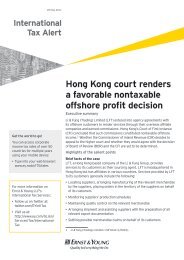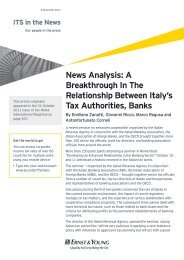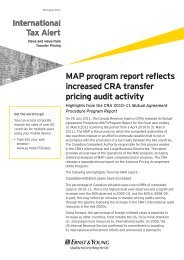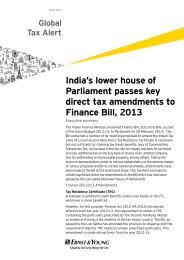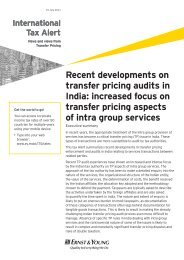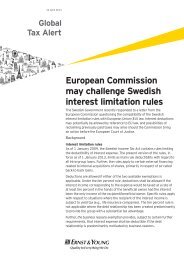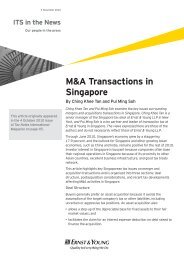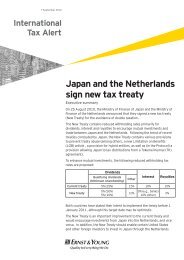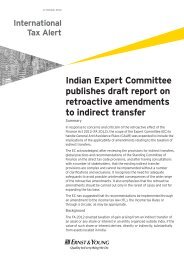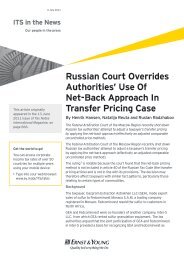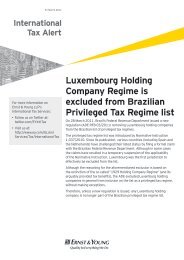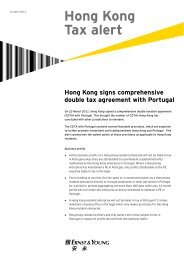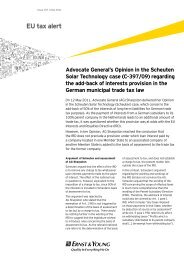(GST) compliance obligations (pdf, 5.62 MB) - Ernst & Young T ...
(GST) compliance obligations (pdf, 5.62 MB) - Ernst & Young T ...
(GST) compliance obligations (pdf, 5.62 MB) - Ernst & Young T ...
You also want an ePaper? Increase the reach of your titles
YUMPU automatically turns print PDFs into web optimized ePapers that Google loves.
Insights<br />
“No penalties if there’s no tax loss. That would be heaven if we<br />
could get to that situation.”<br />
The Senior Tax Manager of a large energy company based in The Netherlands:<br />
“We have a shared services center in The Netherlands; they<br />
do the <strong>compliance</strong> for the Dutch company and for its foreign<br />
VAT registrations. Our biggest difficulty in dealing with the<br />
foreign registration is being very well informed about all<br />
the changes in the legislation. You always depend on your<br />
advisors and luckily we are very well informed, but it’s a<br />
constant challenge.”<br />
“As a Dutch company, we are used to discussing things with<br />
the tax administration. And even if you have done something<br />
wrong, which happens from time to time, there is always<br />
the willingness to deal with things practically — especially<br />
if there is no actual VAT loss, which is usually the case.<br />
Therefore, for companies that are proactive and spot things<br />
themselves, there is an incentive to put things right.”<br />
“What I would like to see in other countries is that you can<br />
approach the tax administrations more easily and have your<br />
A Global Indirect Tax Director<br />
The VAT Director of a diverse MNE group operating in more than 100 countries<br />
discusses an ongoing project designed to achieve 100% VAT <strong>compliance</strong> for the<br />
company globally:<br />
“The project generally is focused on one of our businesses but<br />
there are clearly aspects of what we are learning that can<br />
be borrowed across the rest of our company portfolio. The<br />
initiative really has arisen because we are a global business.<br />
We are in all these different territories and jurisdictions<br />
around the world struggling to comply with all the local rules<br />
everywhere.”<br />
“We want to try to standardize our approach, digitize that<br />
approach and then globalize it. Because once you do have a<br />
standard way of doing things and you have managed to put it<br />
into business systems, ERPs, etc., you then have the ability to<br />
scale it globally into all your operations. If you can completely<br />
harmonize across branches, you drive tremendous efficiency<br />
because that gives tremendous economies of scale and<br />
consistency because effectively you are operating to one<br />
29 VAT and <strong>GST</strong>: multiple burdens for multinational companies<br />
system. That’s part of the motivation here. But our branches<br />
are in different countries and are subject to different rules.<br />
We can standardize 80%; the 20% gets difficult.”<br />
“There is also our corporate culture which is to protect<br />
aggressively, where necessary, the company’s reputation. We<br />
do set great store by complying with all the rules all the time<br />
in all the places. There is no halfway house; either you are<br />
compliant or you are not. That clearly covers everything, not<br />
just tax but everything. That’s definitely part of the cultural<br />
approach here as well.”<br />
“And let’s not be bashful. We have had our knuckles rapped in a<br />
couple of places where we have gone into an audit and come<br />
out a few pounds lighter. We paid our fair dues where we got<br />
it wrong. But once bitten, twice shy.”<br />
own inspector who is on your case. But that means that<br />
both parties have to let down some parts of their guard.<br />
Each one should have a fair position. The tax administration<br />
should definitely get a fair payment of tax. But if we report a<br />
difficulty, the tax administration should be practical and go<br />
light on some other formalistic stuff.”<br />
“We already talk a lot upfront in The Netherlands with the tax<br />
administration. We are also considering a formal ‘horizontal<br />
monitoring’ arrangement. We want that because we want<br />
to have certainty. Preparing for that requires us to put our<br />
house in order. But I would say it is good for our business.<br />
We can use the process to first investigate our own risks and<br />
to get in control ourselves. If we can show to the outer world<br />
that we have certainty on certain topics, that we are ‘clean,’<br />
there is an added value in that.”



